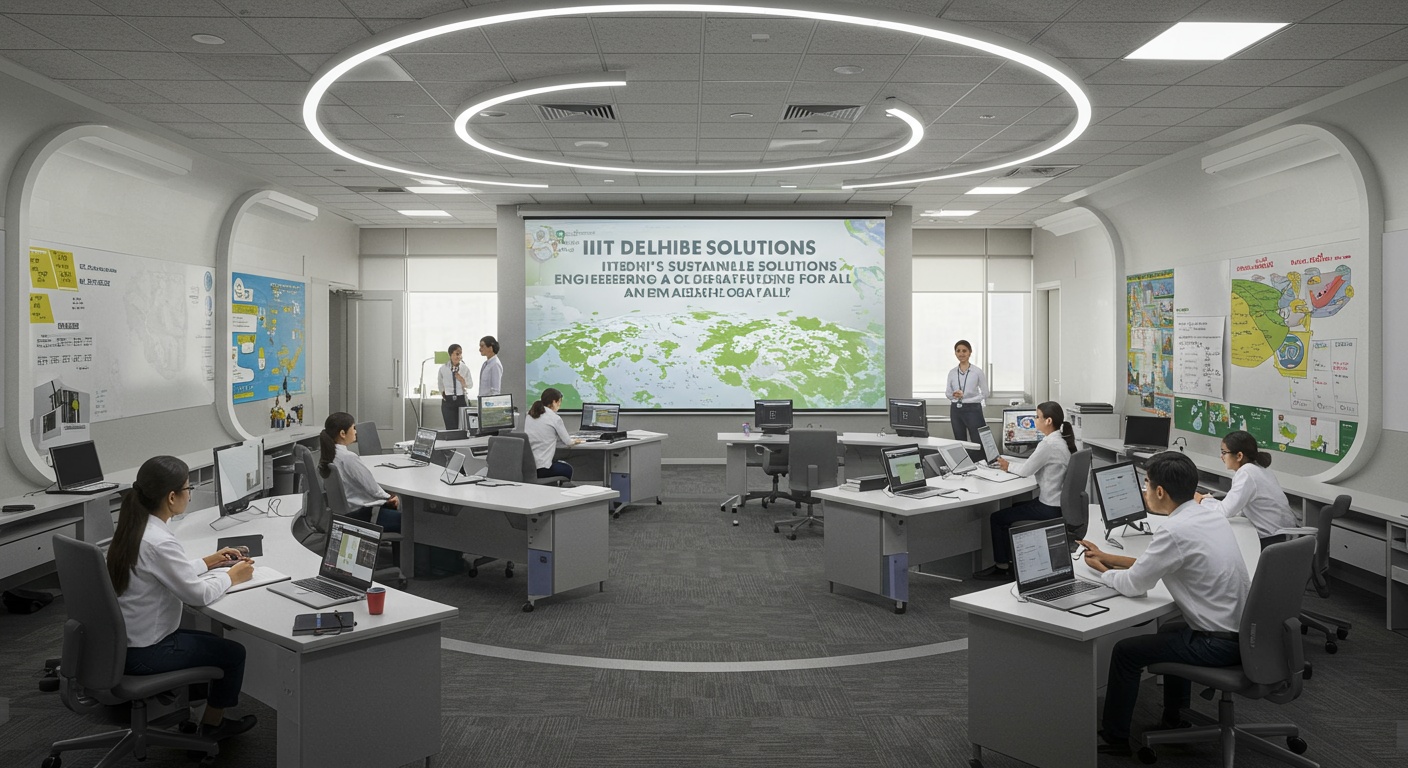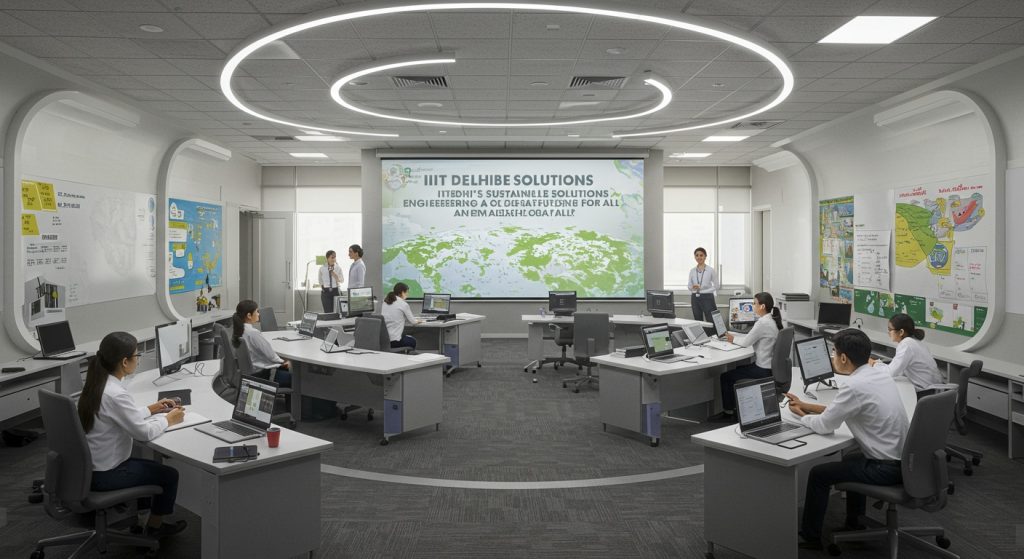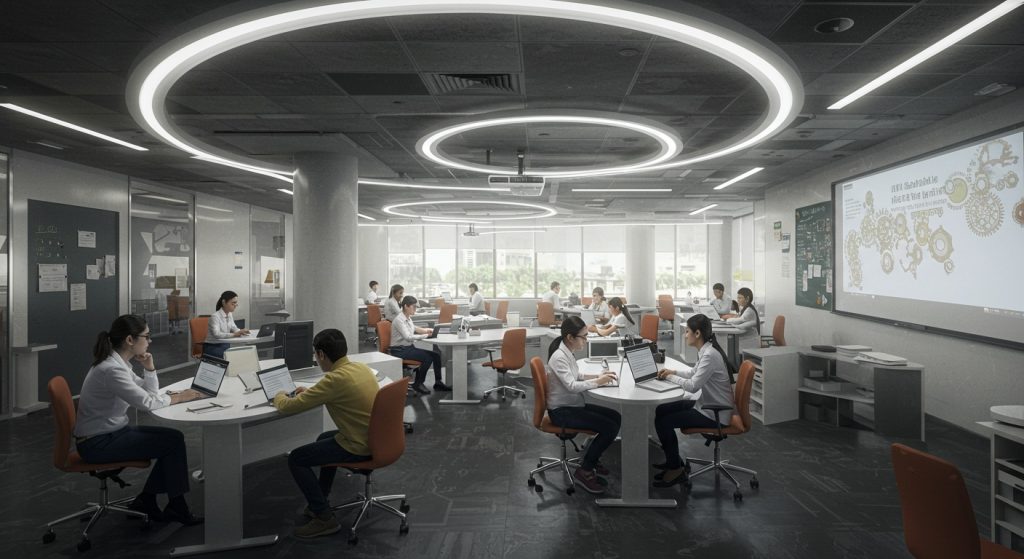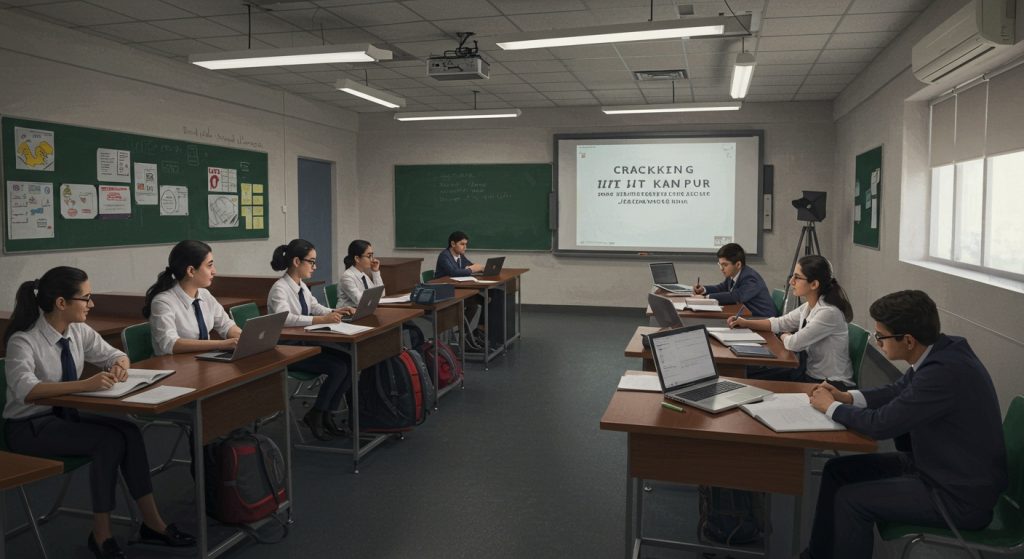Our planet faces unprecedented environmental challenges, demanding innovative solutions for a sustainable future. IIT Delhi is at the forefront, pioneering advancements across diverse engineering disciplines to address these critical issues. From developing novel solar energy harvesting techniques using perovskite materials for enhanced efficiency, to designing advanced wastewater treatment systems leveraging bio-augmentation for effective pollutant removal, our research tackles pressing concerns. We are also exploring smart grid technologies for efficient energy distribution and developing sustainable construction materials using recycled aggregates to minimize environmental impact. This exploration of IIT Delhi’s sustainable solutions showcases how engineering ingenuity is paving the way for a greener future for all, one innovation at a time.

Pioneering Research in Renewable Energy
IIT Delhi is at the forefront of renewable energy research, focusing on developing innovative and sustainable solutions to meet India’s growing energy demands. This includes extensive work on solar energy, wind energy. Bioenergy.
- Solar Energy: Research focuses on improving the efficiency of solar cells, developing cost-effective solar power generation systems. Integrating solar energy into the grid.
- Wind Energy: Studies involve optimizing wind turbine designs for Indian conditions, exploring offshore wind energy potential. Developing advanced control systems for wind farms.
- Bioenergy: Research includes converting agricultural waste into biofuels, developing efficient biogas production technologies. Exploring the use of algae for biofuel production.
IIT Delhi’s Energy Science and Engineering department plays a crucial role in driving these initiatives, fostering collaborations between researchers, industry partners. Government agencies. For instance, the development of novel perovskite solar cells, offering higher efficiency and lower cost compared to traditional silicon-based cells, is a notable achievement. This research has attracted significant attention from both academic and industrial sectors, paving the way for commercialization.
Advancements in Water Resource Management
Water scarcity is a major challenge in India. IIT Delhi is actively involved in developing sustainable solutions for water resource management. This encompasses research on water treatment, wastewater recycling. Water conservation techniques.
- Water Treatment: Development of advanced filtration techniques using nanomaterials, membrane technologies for desalination. Cost-effective methods for removing pollutants from water.
- Wastewater Recycling: Research on technologies for treating and reusing wastewater for irrigation, industrial purposes. Even potable water, reducing the strain on freshwater resources.
- Water Conservation: Studies on efficient irrigation techniques, rainwater harvesting systems. Water-efficient appliances to minimize water consumption.
A prime example is the development of a low-cost, decentralized wastewater treatment system that can be implemented in rural areas. This system utilizes a combination of natural and engineered processes to remove pollutants, making the treated water safe for irrigation. The technology has been successfully deployed in several villages, demonstrating its potential for addressing water scarcity in underserved communities. This initiative aligns with the Jal Jeevan Mission, a government program aimed at providing safe and adequate drinking water to all rural households.
Sustainable Infrastructure Development
IIT Delhi is committed to promoting sustainable infrastructure development through research and innovation in building materials, construction techniques. Urban planning. This involves designing energy-efficient buildings, developing eco-friendly construction materials. Promoting sustainable transportation systems.
- Energy-Efficient Buildings: Research on passive cooling techniques, smart building technologies. Energy-efficient lighting systems to reduce the energy consumption of buildings.
- Eco-Friendly Construction Materials: Development of sustainable alternatives to traditional building materials, such as recycled concrete, bamboo-based construction. Bio-based composites.
- Sustainable Transportation Systems: Studies on electric vehicles, public transportation systems. Cycling infrastructure to reduce carbon emissions from the transportation sector.
The use of recycled concrete aggregate (RCA) in construction is a significant area of research. RCA, derived from demolished concrete structures, can replace natural aggregates in new concrete mixtures, reducing the demand for virgin resources and diverting waste from landfills. IIT Delhi has conducted extensive research on the properties and performance of RCA concrete, demonstrating its suitability for various construction applications. This research has contributed to the development of standards and guidelines for the use of RCA in India.
Waste Management and Circular Economy
IIT Delhi is actively involved in developing innovative solutions for waste management and promoting the principles of a circular economy. This includes research on waste-to-energy technologies, recycling and reuse of materials. The development of biodegradable plastics.
- Waste-to-Energy Technologies: Research on converting municipal solid waste into energy through incineration, gasification. Anaerobic digestion.
- Recycling and Reuse of Materials: Development of technologies for recycling plastics, electronic waste. Other materials, reducing the reliance on virgin resources.
- Biodegradable Plastics: Research on developing biodegradable alternatives to conventional plastics, reducing plastic pollution and promoting a more sustainable economy.
The development of a technology for converting plastic waste into fuel is a notable achievement. This technology utilizes a catalytic process to break down plastic polymers into liquid hydrocarbons, which can be used as fuel or chemical feedstock. The technology has the potential to address the growing problem of plastic waste and reduce the dependence on fossil fuels. IIT Delhi’s collaboration with industries to commercialize this technology shows its commitment to translating research into real-world solutions.
Policy and Community Engagement
IIT Delhi recognizes that technological solutions alone are not sufficient to address sustainability challenges. It actively engages in policy advocacy and community outreach to promote sustainable practices and raise awareness about environmental issues.
- Policy Advocacy: Providing technical expertise to government agencies and policymakers on issues related to renewable energy, water resource management. Waste management.
- Community Outreach: Conducting workshops, seminars. Awareness campaigns to educate the public about sustainable practices and promote environmental stewardship.
- Collaboration with NGOs: Partnering with non-governmental organizations to implement sustainable development projects in underserved communities.
IIT Delhi actively participates in national and international forums to share its research findings and contribute to the development of sustainable development goals. The institute’s commitment to interdisciplinary research and collaboration with stakeholders is crucial for addressing complex sustainability challenges and creating a greener future for all. The work done in the other IITs is also similarly admirable in this area.
| Source | Advantages | Disadvantages | Applications |
|---|---|---|---|
| Solar Energy | Abundant, clean, low maintenance | Intermittent, requires large land area, weather-dependent | Electricity generation, water heating, solar-powered devices |
| Wind Energy | Clean, renewable, cost-effective | Intermittent, noise pollution, visual impact | Electricity generation |
| Bioenergy | Renewable, reduces waste, carbon neutral | Requires land, potential for deforestation, energy-intensive | Electricity generation, biofuels, heating |
Conclusion
Let’s consider this ‘The Road Ahead’ to solidify IIT Delhi’s commitment to a greener future. We’ve seen how cutting-edge research in renewable energy, sustainable infrastructure. Waste management are already yielding tangible results, from improved air quality monitoring systems to innovative water purification technologies. Looking ahead, the integration of AI and machine learning, areas that are revolutionizing computer science, will be crucial for optimizing resource allocation and predicting environmental changes with greater accuracy. We can expect to see more sophisticated smart grids, personalized energy consumption dashboards. Predictive maintenance models for renewable energy infrastructure. The next crucial step is scaling up these solutions and fostering collaboration between academia, industry. Government. IIT Delhi can play a vital role in training the next generation of sustainability leaders, equipping them with the skills and knowledge to drive impactful change. As individuals, we can contribute by adopting sustainable practices in our daily lives, advocating for eco-friendly policies. Supporting businesses committed to environmental responsibility. Remember, every small action contributes to a monumental shift. Let’s embrace this challenge with optimism and determination, engineering a greener future for all.
More Articles
Top Universities for Environmental Science Careers in 2025
Best Environmental Programs: Top Five Universities You Should Consider
Essential Earth Science Courses: Shaping Sustainability Careers for 2025
Top Computer Science Courses for AI and Machine Learning in 2025
FAQs
So, what’s this ‘Sustainable Solutions’ thing at IIT Delhi all about? In a nutshell?
, IIT Delhi is putting a big focus on developing technologies and practices that are good for the environment and good for people. Think cleaner energy, better waste management. Innovations that help us live more sustainably. It’s about engineering a future where we don’t trash the planet!
What kind of specific projects are they working on to achieve this ‘greener future’?
They’ve got their fingers in a lot of pies! Solar energy research is huge, as is water conservation and purification. You’ll also find them tackling air pollution, developing sustainable building materials. Even exploring things like biofuels and electric vehicles. , anything that can help reduce our environmental footprint.
Does IIT Delhi only focus on the tech side of sustainability, or do they consider the social impact too?
That’s a great question! It’s not just about the technology. IIT Delhi definitely looks at the social and economic aspects as well. They interpret that solutions need to be affordable, accessible. Culturally appropriate to really make a difference in people’s lives.
Okay. How does this research actually help people in the real world?
Well, the goal is for their research to translate into practical applications. Think about it: cleaner water technologies being used in rural villages, more efficient solar panels powering homes, or sustainable building practices leading to greener cities. They often collaborate with industries and government agencies to scale up these solutions and make a tangible impact.
Are students involved in these sustainability initiatives, or is it just faculty doing the research?
Definitely! Student involvement is key. There are tons of opportunities for students to participate in research projects, competitions. Workshops related to sustainability. It’s all about training the next generation of environmental leaders.
What’s the long-term vision here? What does IIT Delhi hope to achieve with all this?
The big picture is to become a leading institution in developing and deploying sustainable solutions for India and beyond. They’re aiming to be a hub for innovation, knowledge sharing. Collaboration, ultimately contributing to a more sustainable and equitable future for everyone.
Say I wanted to learn more or even get involved – where should I start looking?
Your best bet would be to check out IIT Delhi’s official website. Look for sections related to research, sustainability, environmental science, or specific departments working on these issues. They often have news, publications. Contact details for relevant faculty and research groups.



